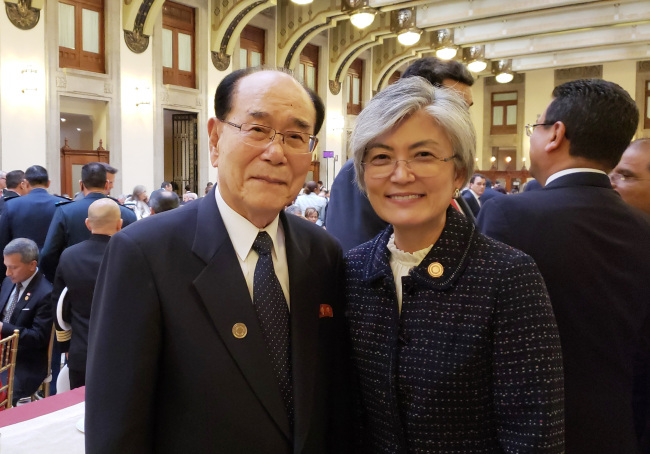The latest series of overseas trips by ranking North Korean officials is a sign of the regime’s efforts to emphasize its policy shift toward diplomacy and a more open economy, coupled with its hopes of being viewed as a normal state before the end of the year, experts say.
Since late November, North Korea’s ceremonial head of state, Kim Yong-nam, has visited several Latin American countries including Venezuela, Cuba and Mexico to improve ties with those nations. He met with South Korean Foreign Minister Kang Kyung-wha in Mexico, according to the South’s Foreign Ministry on Sunday, though the meeting wasn’t planned. Kang expressed her hope to the official that the North Korean leader would promptly make a reciprocal visit to Seoul to strengthen the efforts to bring about lasting peace on the Korean Peninsula.
South Korean President Moon Jae-in visited Pyongyang in September for a summit with North Korean leader Kim Jong-un.
 |
Kim Yong-nam, North Korea`s nominal head of state, left, stands next to South Korean Foreign Minister Kang Kyung-wha in Mexico. (Yonhap) |
“In 2018, North Korea chose a path of strategic shift in both its diplomatic and economic policies to break away from international and to be viewed as a normal state, capable of diplomacy,” Cho Han-bum of the Korea Institute for National Unification said.
“Though meeting Kang was a coincidence for Kim Yong-nam, Kim Jong-un’s reciprocal visit to South Korea would seem like taking a step towards inter-Korean ties and denuclearization, which would be an important event to mention in his New Year’s speech, highlighting the regime’s achievements in 2018,” he added, saying Kim may not have “a lot” to mention in his speech considering the lack of progress in the denuclearization talks with the US.
Regarding the North’s economic policies, North Korean Foreign Minister Ri Yong-ho made a four-day visit to Vietnam last week, where he discussed the strengthening of bilateral ties with top Vietnamese officials, the North’s Korean Central News Agency said Monday.
Though the North’s state-run media didn’t provide many details, a Vietnamese news outlet had reported earlier that Ri and Vietnamese Prime Minister Nguyen Xuan Phuc discussed the Southeast Asian country’s model of economic reform, known as “Doi Moi.”
According to Vietnam Plus, Ri said “in order to build a peaceful environment for (his country’s) economic development, North Korean leader Kim Jong-un has recently intensified external activities with related countries.”
“A core reason behind Kim Jong-un’s willingness to dismantle its nuclear weapons program is for economic development of his country,” Yang Moo-jin, a professor at the University of North Korean Studies in Seoul, said.
“It’s important to achieve internal reform and turn toward an open-market policy for economic development and what’s interesting is that Vietnam is a country that adopted an open-market economy before turning to internal reform. For now, with layers of economic sanctions against Pyongyang still intact, North Korea seems to be adjusting the mood and conditions for economic development by continuing to study the model through the latest Vietnam trip,” Yang added.
Ri’s Vietnam trip comes at a time when Pyongyang is seeking a way to achieve economic development. North Korea has long taken interest in Doi Moi as a viable model for its own economic reform, as Vietnam managed to maintain its socialist identity even after it adopted an open-market economy and attracted foreign capital through the plan initiated in 1986, according to analysts.
Ri is reported to have left for Syria after wrapping up his Vietnam trip. The minister is expected to discuss preparations for a possible summit between Syrian President Bashar al-Assad and Kim Jong-un. Assad said in June that he plans to visit North Korea to meet Kim, KCNA reported at the time.
By Jung Min-kyung (
mkjung@heraldcorp.com)








